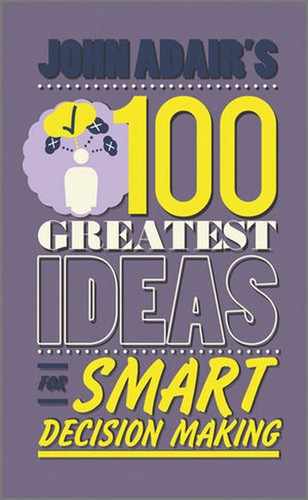Idea 99: Three elements of practical wisdom
A great alchemist created the gold of practical wisdom by fusing in the crucible of his imagination intelligence, experience and goodness.
The Greeks had a word for this combination of intelligence, experience and goodness in practical affairs: phronesis. This was translated into Latin as prudential and thence into English as prudence. A better translation today is practical wisdom.
Intelligence
In this context, to be intelligent means to be able:
- To see the point.
- To sense relationships and analogies quickly.
- To identify the essentials in a complex picture.
- To ‘put two and two together’.
- To find the salient factors in past experience that are helpful in shedding light on present difficulties.
- To be able to distinguish clearly between ends and means.
- To appraise situations swiftly.
- To see their significance in the total setting of present and past experience.
- To get the cue as to the likely line of wise action.
These overlap considerably, but taken together they offer an idea of the kind of intelligence or sense we are talking about.
Experience
In the list above the interdependence of intelligence with experience is evident. Experience can be either experience of life in general, which of course comes only with age, or relevant experience to a given situation.
Familiarity here is based on considerable actual practice. You have personally encountered, undergone or lived through situations not unlike the one now faced. By implication, this past immersion in a subject or field has resulted in superior understanding.
Sometimes, however, gain in wisdom need not be suggested by the word so much as a piling up of involvement. Marshal Saxe’s donkey, it is said, went on twenty campaigns carrying his master’s baggage, but learned nothing about the art of war!
Goodness
The Greeks sensibly had two different words for good: kalos (skilled in, proficient at) and agathos.
In Homeric times, to enquire if a king leader was agathos meant was he courageous, wise and kindly? In other words, did he fight, manage and rule with success? Virtue or normal excellence referred to his art or skill in performing his socially allotted role.
Later, agathos came to refer not to the qualities required to fulfil a role but to certain human qualities that we call goodness.
The element of goodness in wisdom could almost be described as character. By saying that a person has character (as opposed to personality and temperament) we mean that they have:
- A conception of what they should be and what others may rightly expect of them.
- Principles that they will not likely betray.
- Loyalties and commitments of an enduring kind.
- Firmness when subjected to attractive temptations.
- Responsibility for their own actions and an expectation that others will be responsible too.
- A sense of the reality of moral values, so that they are not a matter of personal preference.
